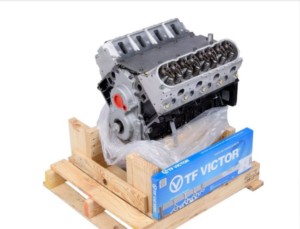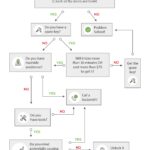Replacing your car engine is a significant decision, often accompanied by a primary question: “How Much Is A New Car Engine going to set me back?”. It’s a query loaded with variables, as the cost isn’t as straightforward as buying a new set of tires. Several factors come into play, making the final price tag a spectrum rather than a fixed point. This guide, brought to you by the automotive experts at cars.edu.vn, breaks down the complexities of engine replacement costs to help you navigate this potentially expensive but necessary repair.
Factors Influencing the Cost of a New Car Engine
The cost to replace your car’s engine can fluctuate dramatically. It’s not just about the engine itself; a web of interconnected elements contributes to the final expense. Understanding these factors is crucial for budgeting and making informed decisions.
Vehicle Make and Model
Perhaps the most influential factor is the make and model of your vehicle. Luxury brands and high-performance vehicles typically command higher prices for engines and parts compared to more common, economy models. Engines for specialized or rare cars can be particularly costly due to limited availability and the need for specialized mechanics. Think of it this way: an engine for a mass-produced sedan will generally be less expensive than one for a high-end sports car or a large SUV.
Engine Type and Size
The type of engine your car uses – whether it’s a four-cylinder, V6, or V8 – directly impacts the price. Larger engines with more cylinders and complex engineering generally cost more to manufacture and, consequently, to replace. Additionally, advancements in engine technology, such as turbocharging or hybrid systems, can also push prices higher.
Labor Costs
Labor is a substantial portion of the total engine replacement cost. Rates vary significantly based on your geographic location, the mechanic’s expertise, and the complexity of the engine swap. Major metropolitan areas typically have higher labor rates than rural locations. Furthermore, a highly experienced mechanic or a dealership service center will likely charge more than an independent local shop. The time required for installation also plays a role; more intricate engine bays or models with complex electronic integrations will demand more labor hours.
New vs. Remanufactured Engines
The choice between a brand-new engine and a remanufactured one is a significant cost consideration.
-
New Engines: These are factory-fresh, never-before-used engines. They offer the peace of mind of zero mileage and come with the latest manufacturer specifications. However, they are the most expensive option.
-
Remanufactured Engines: These are used engines that have been completely disassembled, cleaned, and rebuilt to meet original equipment manufacturer (OEM) standards. Worn or damaged components are replaced with new ones. Remanufactured engines offer a reliable and more budget-friendly alternative to new engines, often with warranties comparable to new units.
[ A close-up of a remanufactured long block engine, highlighting its rebuilt components and factory-standard quality. ]
Warranty Coverage
Engines with longer warranty periods often come with a higher upfront cost. A comprehensive warranty provides protection against potential mechanical failures and can save you money in the long run if issues arise. Consider the length and terms of the warranty when comparing engine options, as a longer warranty can represent better long-term value despite a slightly higher initial price.
Estimating the Replacement Cost: What to Expect
Given these variables, providing a precise figure for a new car engine cost is challenging. However, we can offer a general range to set your expectations.
For a typical passenger car, replacing an engine can range from $3,000 to $7,000, including both the engine and labor. However, this is a broad estimate. For high-performance vehicles, luxury cars, or complex engine systems, costs can easily exceed $10,000 or even $15,000.
Breaking down the costs:
- New Engine (Unit Only): $2,000 – $5,000+ (depending on type and vehicle)
- Remanufactured Engine (Unit Only): $1,500 – $4,000+ (depending on type and vehicle)
- Labor Costs: $1,000 – $3,000+ (depending on location and mechanic rates)
It’s essential to get quotes from multiple reputable mechanics to get a more accurate estimate for your specific vehicle and engine replacement needs.
DIY vs. Professional Installation: Cost Implications
For those with advanced mechanical skills and the right equipment, a DIY engine replacement might seem like a way to save on labor costs.
[ A variety of automotive tools essential for engine replacement, emphasizing the need for specialized equipment for DIY projects. ]
DIY Engine Replacement:
- Pros: Significant savings on labor costs.
- Cons: Requires extensive mechanical knowledge, specialized tools, considerable time investment, and no professional warranty on the labor. Mistakes can be costly and potentially damage the new engine or vehicle.
Professional Engine Installation:
- Pros: Guaranteed workmanship, warranty on labor and often parts, proper disposal of old engine components, and peace of mind.
- Cons: Higher upfront cost due to labor charges.
Unless you are an experienced mechanic, professional installation is generally recommended to ensure the job is done correctly and to protect your investment.
Budgeting and Financing Options
Engine replacement is often an unexpected expense. Here are some budgeting tips:
- Contingency Fund: Add a buffer of 15-20% to your budget to account for unforeseen issues or additional parts needed during the replacement process.
- Shop Around: Get quotes from several mechanics to compare prices and services.
- Financing: Explore financing options offered by auto repair shops or parts retailers. Some may offer payment plans or installment options to spread out the cost.
Choosing the Right Replacement Parts: OEM vs. Aftermarket
When replacing an engine, you’ll encounter the choice between OEM (Original Equipment Manufacturer) parts and aftermarket components.
- OEM Parts: These are parts manufactured by the original vehicle manufacturer or their approved suppliers. They guarantee fit and quality but are typically more expensive.
- Aftermarket Parts: These are produced by third-party companies. Quality can vary widely. Reputable aftermarket brands can offer comparable or even superior quality to OEM at a lower price.
For critical components like engine internals, opting for OEM or high-quality aftermarket brands is advisable to ensure reliability and longevity.
Conclusion: Making an Informed Decision
The cost of a new car engine is a multifaceted issue, influenced by vehicle specifics, engine type, labor rates, and your choice of engine (new vs. remanufactured). While DIY installation might seem appealing for cost savings, professional installation offers assurance and warranty protection. By understanding these factors and obtaining detailed quotes, you can navigate the engine replacement process with confidence and make informed decisions that balance cost, reliability, and the longevity of your vehicle. For more expert advice and to explore your options, visit cars.edu.vn – your trusted resource for automotive knowledge.
FAQ/People Also Ask
How much does it cost to replace an engine?
Engine replacement costs can range from $3,000 to over $10,000, depending on the vehicle, engine type, and labor rates. Getting a specific quote for your car is essential.
Are remanufactured engines a reliable and cost-effective option?
Yes, remanufactured engines are generally reliable and more cost-effective than new engines. They are rebuilt to OEM standards and often come with warranties, offering a good balance of quality and price.
What factors contribute to the variation in engine replacement costs?
Key factors include vehicle make and model, engine size and type, labor costs in your area, whether you choose a new or remanufactured engine, and warranty coverage.
Can I replace my engine myself to save on labor costs?
Yes, it’s possible for experienced mechanics, but it requires specialized tools, knowledge, and time. Professional installation is generally recommended for most car owners.
Are there financing options available for engine replacement expenses?
Yes, many auto repair shops and parts retailers offer financing options to help manage engine replacement costs. Explore available payment plans to find one that suits your budget.

